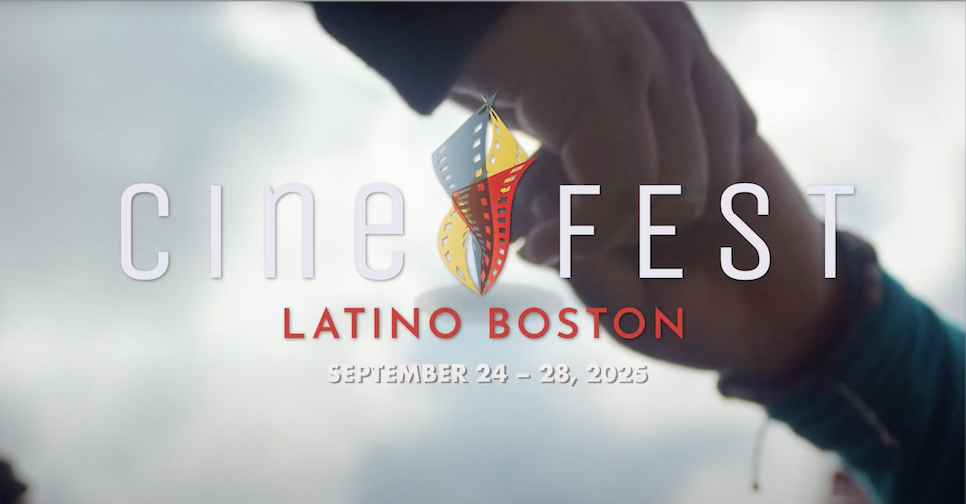CineFest Latino Boston presents: Dirigido por Mujeres
Gray Gailey ‘27 / Emertainment Monthly Staff Writer
September 24th to 28th marked the 3rd annual CineFest Latino Boston. The festival, founded by Sabrina Avilés, aims to uplift Latinx voices and stories from across the globe.
Scattered across iconic Boston venues, including the Emerson Paramount Theater, Museum of Fine Arts, and Boston Public Library, films ranged from animated shorts to poignant documentaries and futuristic fiction. Among the short programs was a curated collection of films directed by women, called Dirigidos por Mujeres–Yo Misma Fui Mi Ruta, which translates to “Directed by Women–I Myself Was My Route.” The title references a famous Spanish poem by Julia de Burgos, who wrote about her struggles as a Black Puerto Rican woman facing gender norms, discrimination, and social injustice.
While loosely tied together by themes of community and identity, each short was uniquely thought-provoking and powerful.
The program opened with The Crest, a partially animated short by Puerto Rican director Nanichi Nieves Díaz. The film could best be described as visceral, with uncomfortable sounds and unsettling images such as doctors sewing a rooster’s crown onto a paper cutout baby (it’s a boy!). The screen panned to a teenage boy wearing makeup, flipping through a photo book. His parents called to him, and audiences watched as he slipped on a rooster’s crown, an artful reference to gender identity and expectations.
The second film, Woman Who Lives at the End of Time, was a fictional short by Emerson professor Cristina Kotz Cornejo. Set in Mexico City in 2030, the film was as relevant as ever. Taking course over the stretch of a stressful 24 hours, Woman Who Lives at the End of Time follows a women’s collective who takes in a mysterious stranger from the U.S.
What follows are interpersonal conflicts and ongoing questions around the stranger’s identity and the safety of the other women. Kotz Cornejo, who spoke after the film’s screening, said she had been working in immersive media for a while, but wanted to return to fiction to tackle an immigration story. The film frequently referenced the current U.S. administration, with lines such as, “Everything in the U.S. comes from that Project in 2025.”
The Last Jews of Guantanamo by Yael Bridge was the first documentary short of the night. In the early 1960s, the Cuban government banned all public displays of religion, resulting in 90 to 95 percent of Jews fleeing Cuba. In 1991, the country repealed its ban on religious practice. Bridge’s short follows two octogenarians, Fortuna and Lídia, who are finally able to celebrate their Bat-Mitzvahs openly. What we witness is a powerful display of family, resilience, and devotion to faith.
Changing up the mood in the theater, the music of Aditya Joshi’s A West Side Story Story blares. The narrative short follows a young Puerto Rican theatre director in the U.S. as she struggles to hold together her “culturally authentic” version of West Side Story. She is under immense pressure, not only because “Lin, Benito, and Rita” (Lin-Manuel Miranda, Bad Bunny, and Rita Moreno, the original Anita in West Side Story) may be in the audience, but because she can feel the weight of her ancestors and the fear of letting them down. The film criticizes the lack of authenticity and the whitewashing that occurred in both the original movie and the 2021 remake.
When her cast and crew shrugged off the counterfeit elements, which included non-Puerto Rican costumes, a flag hung incorrectly, and an inauthentic accent, she insisted, “Puerto Ricans will notice.”
The fifth short of the night was titled Chelis. Shot in black and white, Chelis was a single-camera film that depicted a day in the life of a 98-year-old woman. We follow Chelis through her daily routine with her care nurse: breakfast and medication, trying to recall fading memories, using the bathroom and washing up. The film, personal and raw, shows the monotony and dignity of the final stage of life.
Mexican director Mariana Tames, who also spoke after the screening, said she came up with the idea after visiting her grandmother, who is, in fact, the Chelis we meet in the short. She was shocked to see how Chelis depended on her nurse just to live. “It was a 5-day shoot,” said Tames, “and because it was so personal and intimate, [the crew] was me and me.”
Chelis died just one month later, cementing her legacy in film for her family, friends, and audiences worldwide.
The last short in the program was a Brazilian piece by Vitória Fallavena and Thassilo Weber, titled I Don’t Know If I’ll Have to Say Everything Again. In a fictional narrative piece, Fernando greets his mother for their weekly meeting in a café. As he does every week, Fernando tries to tell her he is gay—yet due to his mother’s Alzheimer’s, she struggles to remember.
Or, perhaps, she struggles to forget.
This set of films—and the conversations they evoke—represent exactly what CineFest aims to do: create a space for underrepresented voices to not only be heard but also celebrated. For many of the female directors, their shorts were an opportunity to tell stories that, until recently, could not be told. Some of the films, namely Woman Who Lives at the End of Time, also serve as powerful wake-up calls.
CineFest Latino is still a young festival, but this year confirmed it is as needed as ever, and audiences are excited to see what it has to offer next year.
